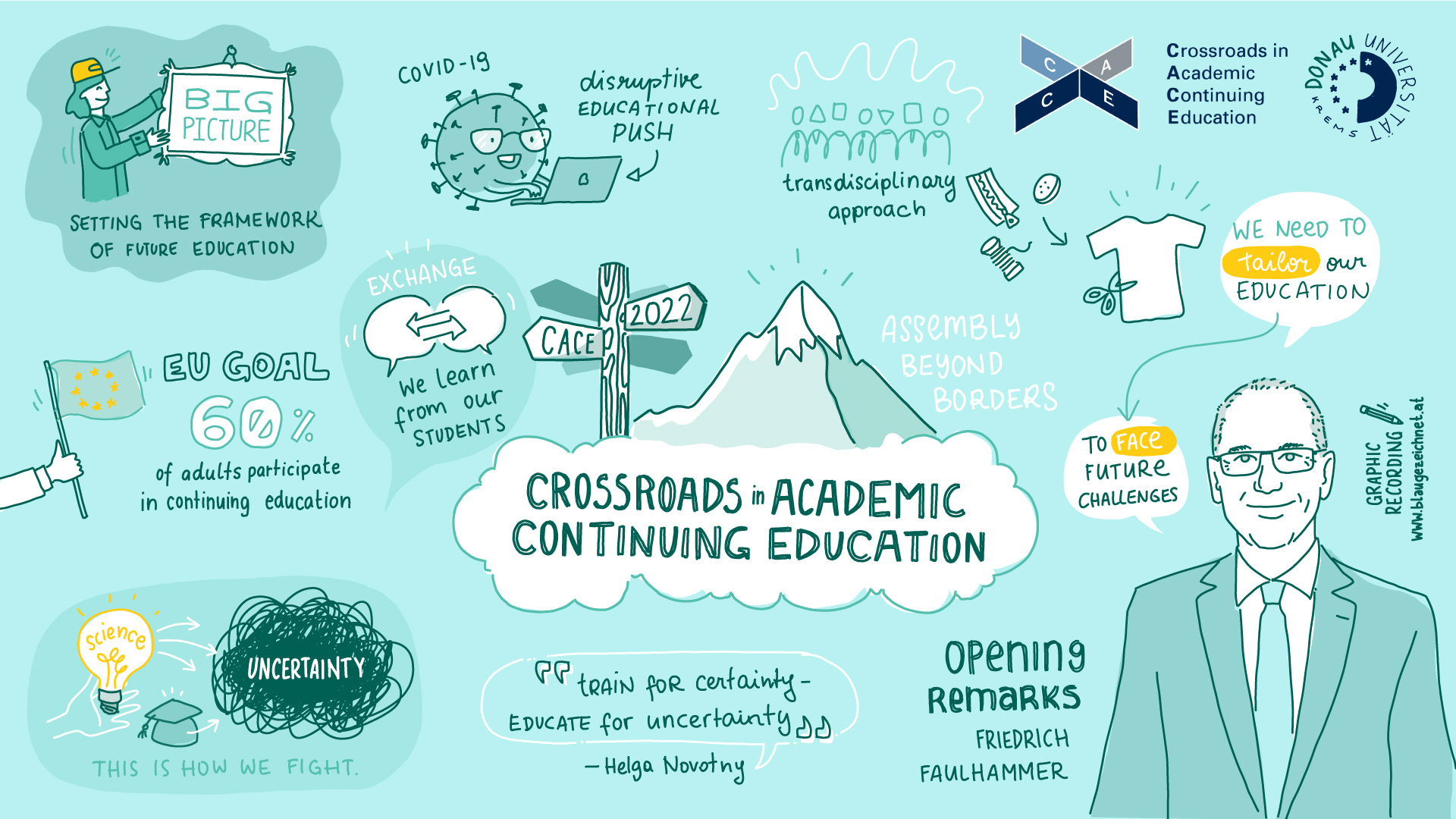Online
ABOUT CACE
Connecting ideas, sharing strategies, fostering innovation, exploring boundaries - on December 1st, 2022, the third Crossroads in Academic Continuing Education (CACE) virtual event was taking place.

Thematic focus:
- Visionary ideas on the future of academic continuing education
- Flexible curricula and individual learning paths in academic continuing education
- The role of culture and internationalization in academic continuing education
- Curation and quality assurance in academic continuing education
- Ecosystem challenges and financial aspects of academic continuing education
Review
The „Crossroads in Academic Continuing Education“ (CACE) event series focuses on the future of university-level continuing education. On December 1, 2022, the event, initiated by the University for Continuing Education Krems, entered its third round.
In his opening speech, Rector Friedrich Faulhammer emphasized the momentum in the field of continuing education and referred to the European Union’s goal of ensuring that at least 60 percent of all adults participate in continuing education training annually by 2030.
During times of great uncertainty, science and education play an even more significant role, according to Faulhammer. He advocated for perceiving uncertainty as an opportunity rather than a threat. For example, the COVID-19 pandemic has led to disruptive digitalization while also promoting new forms of collaboration and cooperation across various sectors. Given the increasing complexity of the world, it is not surprising that science and its methods provide valuable evidence for understanding. Faulhammer explained that academic continuing education contributes to society by offering effective solutions to these challenges.
The University for Continuing Education Krems engages in research and teaching focused on current and future societal challenges. Through its transdisciplinary approach, it combines the expertise of different academic disciplines with practical knowledge. This knowledge transfer is facilitated by its students, who bring extensive professional experience to the table. Transdisciplinarity is seen as a key to finding solutions to complex problems and fostering innovation.
blaugezeichnet.2023-01-09-10-35-28.jpg)
The event also provided opportunities for discussion. Will so-called micro-credentials compete with traditional academic degrees in the future? Markus Marti, Head of Continuing Education at ZHAW School of Engineering in Switzerland, sees them as complementary rather than a replacement. Mairéad Nic Giolla Mhichíl, Professor at the National Institute of Digital Learning at Dublin City University, shares this view and believes that the notion of one academic degree being enough for an entire professional life is outdated. Micro-credentials provide a way to highlight additional competencies, including non-academic ones.
Thierry Koscielniak, Chief Digital Officer at the Conservatoire National des Arts et Métiers in Paris, discussed ways to promote digitalization. Digital tools can assist in communication and networking, while also contributing to climate protection by reducing unnecessary travel. The transition to these tools poses a challenge, particularly for educators accustomed to in-person teaching. Daniela Trani, Director of the YUFE Alliance of European universities, firmly believes in the added value of digitalization. While many universities possess academic expertise, they often lack the necessary technical skills. Additionally, these new possibilities should be made accessible to students with disabilities to ensure inclusivity.
The discussion also addressed the EU’s 60 percent participation goal. Switzerland has already achieved this milestone, as noted by Markus Marti. Daniela Trani emphasizes the importance of promoting lifelong learning starting from elementary education.
Keynote Talks | CACE 2022
Contact
Tags
blaugezeichnet.jpg/jcr:content/22_CACE_Mhichil_DonauUniKrems_(c)blaugezeichnet.jpg)
blaugezeichnet.jpg/jcr:content/22_CACE_Marti_DonauUniKrems_(c)blaugezeichnet.jpg)
blaugezeichnet.jpg/jcr:content/22_CACE_Trani_DonauUniKrems_(c)blaugezeichnet.jpg)
blaugezeichnet.jpg/jcr:content/22_CACE_Koscielniak_DonauUniKrems_(c)blaugezeichnet.jpg)
